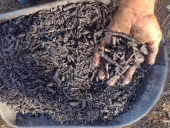You can use an ec meter (electrical conductivity) in the water you are soaking the biochar. The measuremwnts will rise as minerals are released from the manure and after a while they will get lower or stable as the biochar removes them from the water.
Alternativelly, just leave for as long as it is practical for you.
If you worry about anaerobes, drsin the water, mix some good finished compost or vermicast and leave it for a few days. If not to fine, biochar will have aerobic conditions and your aerobic microbes should dominate. If the pile geta hot, just wait for it to cool and smell it before aplication. Hope this helps.
Camilo



